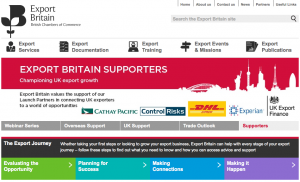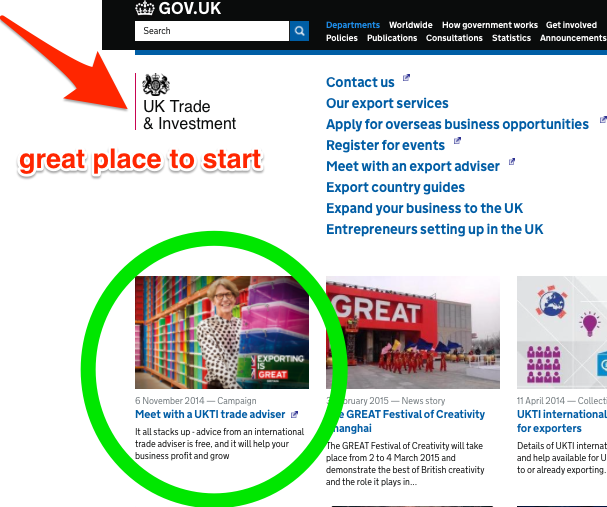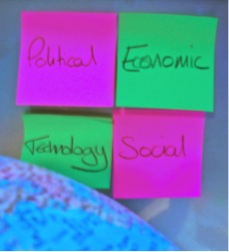Archives for Planning

Fiona Tester, International Trade Manager, Cambridgeshire Chambers of Commerce, with Cintra Translation Business Development Manager, Anthony Gray
Planning to export? Read the Cintra Translations’ how-to on researching new customers and markets abroad
For the fourth and final blog in our Planning to export series, we’re answering the question we’re most often asked by companies thinking about exporting: How can we cut the cost of exporting without cutting corners and damaging our reputation?
There is financial help out there for first-time as well as experienced exporters, most of it in the form of grants towards specific types of expenditure – research, translation and interpretation, and training your staff. In fact there are real financial incentives to seeking advice even when your export plan is still very much at the back of an envelope stage.
Where to start? You really can’t do better than head straight to the UKTI and the British Chambers of Commerce. Find your local international trade team on the UK Trade & Investment website at www.ukti.gov.uk/export/unitedkingdom/contactus.html. Visit www.britishchambers.org.uk.
The UKTI can offer first-time exporters subsidised training and free export capability assessments under the UK Trade & Investment’s Passport to export scheme. There’s tailored advice and support that’s largely free. Find out more about the Passport to export scheme: www.ukti.gov.uk/export/exporting/startingexporting.html. They’ll point you to the range of financial help currently on offer from the Government, including help with the cost of visits to overseas markets and trade shows. The Export Communications Review Scheme offers help with in-depth advice from regional experts on your on- and offline marketing material, helping you build a do-able action plan from adapting your website to finding quality translation and interpreting services. (Don’t forget to check out discounts we’re offering exporters in our Go Global export packages!)
Have look at our post, Using – and affording – commercially available sector-specific market research While commercial market research doesn’t come cheap, both the UKTI and the British Chamber of Commerce do offer help with projects either done in-house or by a specialist agency.
Get leads for free Once you’re plugged into the UKTI and Chamber of Commerce networks you can sign up for their newsletters and help forums. All free. They’ll invite you to free or low-cost seminars, webinars, information and networking events. All can be valuable sources of market research, contacts and even business leads. Check out Innovate UK’s EU Enterprise Network site too. They promote sector-specific opportunities, including details on grant funding in agri-tech, biotech and engineering innovation.
Catch up with the earlier blogs in our Planning to export? series
Planning to export? There’s a lot on offer from the British Government via the UKTI
Planning to export? Your local Chamber of Commerce – a one-stop shop for export expertise
Planning to export? Using – and affording – commercially available sector-specific market research
 The third in the Cintra Translation Planning to export? series focuses on finding and affording relevant commercially available sector-specific market research.
The third in the Cintra Translation Planning to export? series focuses on finding and affording relevant commercially available sector-specific market research.
Hot drinks, cold drinks, men’s grooming products, cold and cough remedies, small appliances, medical appliances. Whatever market you’re in, and wherever you want to export, commercially available reports will help you crunch the numbers and get a feel for the extent of new opportunities. Before you buy, though, get in touch with your local UK Trade & Investment trade team. Ask them to talk you through their Export Marketing Research Scheme. It’s free, and in addition to helping your in-house staff to research markets alongside their day job, UKTI advisors will help with briefing any specialist marketing agencies you may decide to bring on board. And so that you’re not reinventing the wheel on research that’s already out there, the UKTI will also help you pick a path through the stacks of commercially available in-depth reports. Best of all, they can offer some financial help towards buying relevant off-the-shelf publications.
Leaving aside off-the-shelf publications for a moment, we’ve mentioned in a previous blog that you can actually commission British consulates overseas to compile information specifically for your business. The Overseas Market Introduction Service (OMIS) is accessed through the UKTI, and is a fast and cost-effective way to get reliable, up-to-date answers to country-specific questions. Typically, costs for full in-country reports are equivalent to half a long-haul airfare and they’re researched by people with local know-how.
What else is out there? Euromonitor and Mintel are the big names in commercial market research. Each year Euromonitor publishes more than 17,000 reports on 27 industries, 200 sub-categories and thousands of companies in 80 countries. Mintel has a similar reach, and like its competitors, cuts its research into packages on new products, trends and market size. Reports don’t come cheap, but this is exactly why it pays to find out more about theUKTI Export Marketing Research Scheme.
Avoiding risky business A bit further down the export route, once you’re considering hooking up with new partners and customers in your marketplace, Experian International Business Reports can help you manage risk. Available through your local chamber’s export services, and the British Chambers of Commerce website, these reports help you do your due diligence on over 45 million businesses in more than 238 countries worldwide.
Top Tips. A subscription to your trade association could repay you handsomely with sector-specific knowledge and experience of markets abroad. Find out if your sector is represented at the Trade Association Forum.
What do you do with all that research once you’ve got it? We come back to the value of your local UK Trade & Investment trade team. They’re the ones with the expertise to help you shape it all into a plan and then turn that plan into profit!
Planning to export? Read Cintra Translation’s other how-tos on researching new customers and markets abroad
What’s on offer through the UKTI – the British Government’s Trade and Industry arm.
Expertise on tap from the British Chamber of Commerce and your local Chamber of Commerce.

 The second in Cintra Translations’ series on how to research new customers and markets abroad focuses on the ways your local Chamber of Commerce can plug you in to a hugely valuable international network of expert advice and practical support.
The second in Cintra Translations’ series on how to research new customers and markets abroad focuses on the ways your local Chamber of Commerce can plug you in to a hugely valuable international network of expert advice and practical support.
First stop is the British Chambers of Commerce international trade website, ExportBritain. For companies at the early stage of evaluating opportunities and researching target markets, the British Chambers’ Overseas Market Intelligence services offer regularly updated market snapshots sharing data and insight.
Use the International Directory to get in touch with British Chambers located overseas in just the markets you’re considering.
 Your local Chamber of Commerce will already be running regular events highlighting opportunities for export. There’s real depth and breadth to seminars and workshops exploring potential growth markets. Over the next couple of months alone, the Norfolk Chamber is assessing opportunities in Kuwait; Surrey is looking at doing business in Brazil’s massive marketplace, and Cambridgeshire is planning an event with the UKTI to help businesses find out more about what wealthy Saudi Arabia can offer UK exporters.
Your local Chamber of Commerce will already be running regular events highlighting opportunities for export. There’s real depth and breadth to seminars and workshops exploring potential growth markets. Over the next couple of months alone, the Norfolk Chamber is assessing opportunities in Kuwait; Surrey is looking at doing business in Brazil’s massive marketplace, and Cambridgeshire is planning an event with the UKTI to help businesses find out more about what wealthy Saudi Arabia can offer UK exporters.
Find out more on the events page at Export Britain: http://exportbritain.org.uk/events/ You’ll also find webinars you can attend from your desk or your iPad. Expert-led discussions on prospects in India and China, and in niche sectors such as agri-business opportunities in Colombia on are on the current schedule.
Are you ready to export? While you’re looking at how ready and receptive overseas markets will be for you and your products, how prepared are you to take the leap? Have you got the staff, skills, resources and logistics in place to make a go of it? Probably not – at the moment – but chances are, it won’t take much to fill the gaps. Find what they are and how to get in shape via the Chambers’ Export Readiness Assessment service.
Seeing the wood for the trees You’ll have realised by now that figuring out if export’s for you and where to focus your efforts isn’t going to be a journey you make on your own. It’s clear there is plenty of support out there for SMEs. In fact, there is some criticism that there’s so much on offer, businesses feel daunted and can’t see the wood for the trees.Watch movie online The Transporter Refueled (2015)
 To provide an encouraging and genuinely supportive, and yes, we have to say it, joined-up, approach very much in mind, the British Chambers of Commerce, the UK Trade & Investment (UKTI) and the Foreign and Commonwealth Office have been in formal partnership since 2012. They’re also working with businesses like us here at Cintra Translations to help businesses find the extra skills and professional support services they need to get into those new markets on the front foot. As an example, take a look at the package of services and benefits for exporters on offer from the Cambridgeshire Chambers of Commerce. We’re proud to signpost you to our contribution to their Global Membership package – including exclusive discounts on Cintra Go Global translation services! Find out more
To provide an encouraging and genuinely supportive, and yes, we have to say it, joined-up, approach very much in mind, the British Chambers of Commerce, the UK Trade & Investment (UKTI) and the Foreign and Commonwealth Office have been in formal partnership since 2012. They’re also working with businesses like us here at Cintra Translations to help businesses find the extra skills and professional support services they need to get into those new markets on the front foot. As an example, take a look at the package of services and benefits for exporters on offer from the Cambridgeshire Chambers of Commerce. We’re proud to signpost you to our contribution to their Global Membership package – including exclusive discounts on Cintra Go Global translation services! Find out more
 Planning to export? Read the Cintra Translations’ how-to on researching new customers and markets abroad
Planning to export? Read the Cintra Translations’ how-to on researching new customers and markets abroad
Today on the Cintra blog we’re kicking off a four-part mini series that will help you find, research and compare potential new markets for export.
We’ll also point you to sources of information for insights on the spending power, habits and preferences of your new customers. And you won’t want to forget a thorough analysis of competitors all after slices of the same pie.
Sounds time-consuming and expensive, not to say daunting? Yes – you certainly need to invest time and there are costs to any expansion plans. But don’t be put off: there’s plenty of expert help around. Much of it is free online. But there’s no substitute for sitting down face-to-face with a real expert, though, and the good news is, the UK Government agrees. In its search for the income and boost to UK growth exports deliver, there’s substantial help available free and at heavily subsidised rates through the UKTI – the British Government’s Trade and Industry arm. That’s the subject of our first blog here, so read on.
In blogs to follow we’ll explore how membership of your local Chamber of Commerce will tap you into an experienced network, offering help with the challenges of logistics and paperwork, as well as marketplace snapshots and in depth analysis.
And we’ll explore the range of financial help, including grants to help you afford commercially available sector-specific research from the big names in market analysis. There are even grants towards professional translation and interpreting services, so do stay tuned!
We’ll start with what’s on offer from the UKTI: support, advice and even inspiration for growing your business. You wouldn’t necessarily expect it from a government organisation, but in our experience, the UKTI’s big strength is in its personal touch.
Start by booking your free appointment with one of the UKTI ‘s Export Advisers. Why? On average, companies earn £100k in additional sales within 18 months of working with UKTI, and most of the advice given by their trade experts is FREE.
 All you need to do is apply on the UKTI website: http://www.greatbusiness.gov.uk/ukti/ Fill in the contact form. There’s also a phone advice line: 0300 456 3565
All you need to do is apply on the UKTI website: http://www.greatbusiness.gov.uk/ukti/ Fill in the contact form. There’s also a phone advice line: 0300 456 3565
Go to export events If you’d prefer to dip in just a toe before getting up close and personal on a one-to-one level, look out for regular events with an export focus organised by the UKTI. These offer a chance to network with other companies at different stages on the export route.
Find out more and register for updates and invitations: http://www.events.ukti.gov.uk
Did you know that you can actually commission overseas consulates to compile information specifically for your business? That’s a step that was vital to the export success of specialist engineering company, Meltech. Have a look at their case study on the UKTI website. “We have commissioned several Overseas Market Introduction Service (OMIS) reports to get vital local knowledge,” says Meltech sales director, Peter Drever. “If we are looking at a new market, one of the first things I would turn to is an OMIS report. Look at it this way: one such report, containing comprehensive local information, typically costs the equivalent of half an airfare.”
Go online for help and advice on every aspect of the planning and practicalities of exporting. Case studies, financial support, training courses and country specific advice: – it’s all there on the UKTI Business is Great website: http://www.greatbusiness.gov.uk/information-and-training-for-first-time-exporters/
Does exporting add up for your business? If you’re looking for basic, big picture and up-to-date economic and demographic information, one place to start is with regional and country summaries from the Foreign and Commonwealth Office (FCO). The FCO factsheets will kick-start your desktop research with population stats, and country comparisons and rankings on levels of development and ease of doing business. And complete your target country PEST(LE) analysis (see our earlier blog) with robust information on political, economic and security risk, including assessments on bribery, threats to intellectual property and levels of crime. Go to: https://www.gov.uk/government/collections/overseas-business-risk
Get the rest of the Cintra Go Global Planning for Export Success series straight to your inbox. Sign up in the left-hand navigation bar on this page.
 Are you looking to export your products and services, but worried about how to communicate with customers, distributors and agents?
Are you looking to export your products and services, but worried about how to communicate with customers, distributors and agents?
Everyone in business understands that people like to buy from companies they know and trust. When you’re selling into markets overseas, it really is a no-brainer that, to get the leads and sales you need, you’ve got to talk to people in their own language. So, with that in mind, you look at the marketing materials you’ve already got – all those leaflets and flyers, brochures and product factsheets. You’ve seen the return on your investment in all that promotional material, but it’s all in English, of course. You go online, count the pages on your English-language website, and wail, “Where do we start?” “How much is translating all this going to cost?”
Don’t shelve your plans and pull up the duvet just yet. Have a look at our marketing materials for export success how to. It’s a checklist we’ve developed to help you achieve the goals of every successful export sales campaign:
- Create the best possible impression for your company and brand in your new marketplace
- Communicate with relevant and effective marketing materials in your customers’ languages
- Secure real value for money and return on investment in translation services
The Cintra marketing materials for export success how to checklist:
1. Plan
What are you going to translate? Why? Who are your readers?
You don’t have to translate everything. Our Go Global basics list is a good place to start:
- Website: home page, about us and product page/s
- One company brochure
- Promotional poster/s for events and exhibitions
- Product or services fact sheet or leaflet
- An email introducing your company to agents or distributors
- A standard response email
Other materials to consider for translation are:
- Critical legal documents and contracts
- Your business terms and conditions
- Technical manuals and product brochures
- Contracts of employment
2. Get the timescales right
Professional translators and interpreters are used to working to very tight deadlines, but it pays dividends to give them time to polish the nuanced translations your marketing messages deserve. Think back to how long it took you to agree the final wording in English!
3. Quality originals
Language and layout in the original source documents you want translated should flow naturally, be clear and engaging.
4. No gobbledegook
Describe your products and services as simply as possible, and avoid clichés, jargon and acronyms that will need to be explained to customers who aren’t familiar with life in the UK.
5. Share your big picture business goals and the thinking behind your export campaigns
In return you’ll benefit from the expertise of native speakers and their professional insight into the day-to-day lives and expectations of customers in your target markets. Add the translator’s personal experience to your own in-depth research and you’ve got a real head start on understanding local market conditions and the dos and don’ts of business etiquette.
6. Fit your message to your audience
Your company’s distinctive tone of voice is an important element of each customer’s experience. And you can expect expert translators to add enormous value to your marketing campaigns. They’ll do more than translate word for word: they’ll find exactly the right words to get the features and benefits of your offer across in ways that will strike just the right note with new customers your target overseas markets.
Translators will also find the right tone for your marketing communications. In just the same way that you wouldn’t want to turn up for a business meeting wearing the wrong clothes, misjudging the balance between formal and more colloquial language can be a deal-breaker.
7. Work smart on layouts and formatting
Supply documents in easily editable formats that don’t need to be reformatted before the translator can start work.
Some languages are wordier than others, which means word counts vary between languages, so ask ahead about changes you might need to make to the formatting and layouts of documents and web pages. 100 words expands to around 130 when translated into French, for example. On the other hand, English to Lithuanian works out more shorter, as there are no a’s, an’s and the’s to take up space.
8. Mistakes and typos mean careless in any language
Make sure a native speaker checks spelling, grammar, punctuation and contractions just as carefully as you’d expect for your English-language documents.
9. Take advantage of advice and grants for export on offer
Our Planning to export? blog series points you to the wealth of information available for exporters from the Government and through your local Chamber of Commerce.
Start by visiting their online advice sites
Read case studies and download resources; find out about local events, briefing sessions and training courses.
Businesses can get details of Government grants and support, including an expert communications review to help with translating your marketing materials.
There’s more on planning a successful export strategy in our blog posts
Two planning tools to help make your business an export success story
Planning to export? Here’s how to go global
Planning to export? Go Global with support from your local Chamber of Commerce
Planning to export? Using – and affording – commercially available market research
Planning to export? Financial help for new exporters
Two planning tools to help make your business an export success story
- Export success boosts small business profits by as much as £100K a year.
- Six in 10 small businesses will be exporting by 2016.
- 85% of businesses surveyed told UKTI that exporting led to levels of growth ‘not otherwise possible’.

These big numbers are helping build confidence in the small and medium-sized business community that exporting is a worthwhile way of growing turnover and profits. Export success story case studies are encouraging too.
- In just five years, The Cambridge Satchel Company
 graduated from kitchen tabletop, to iconic accessory in 110 countries, clearing £5 million in export earnings alone.
graduated from kitchen tabletop, to iconic accessory in 110 countries, clearing £5 million in export earnings alone. - Bike infrastructure innovators Cyclehoop
 are now on the streets in 15 European countries, New Zealand, Canada and Japan.
are now on the streets in 15 European countries, New Zealand, Canada and Japan. - Six-year-old Tangle Teezer
 hairbrushes are sold online into the 290 million Chinese consumer market from just one UK-based desk.
hairbrushes are sold online into the 290 million Chinese consumer market from just one UK-based desk.
Growing your business to an export success story
To see your business featured in the list of export success stories, you need to be confident that your products, your services and your marketing strategy will deliver real returns in a reasonable timeframe. And of course, when you’re doing it all on a very tight budget, it’s even more of a challenge to know where to best invest time and money. These two classic management tools will help make your business an export success story. They’re all about diving deep into your target markets before you actually put a toe in the water!
1 PEST is best
Everyone knows about SWOT analysis: taking an in-depth look at your
Strengths/ Weaknesses/Opportunities/Threats
If you’re looking to export successfully, a PEST brainstorm of your target overseas markets us a must. Set up a grid, just as you do for a SWOT, but this time, do your research on your target markets focusing on:
P for Political situation
E = Economic
S= Social factors
T = Technology.
Exporters can usefully turn a PEST into a PESTLE by adding in Legal and Environmental to the matrix.
You may feel you’ve thrown up more questions than answers. And that’s the point. It’s researching the answers that make a PESTLE well worth the time and effort.
2 Six Hats for success
Edward de Bono’s classic Six Hats exercise is really several tools in one.
- Helping you develop new products or services
- Warning of bear traps and banana skins
- And once you’ve looked at what you do from the viewpoint of all six hats, you’ll have a robust Plan B for when it rains on your parade
Six Hats works like this: get your team together and view your export plans through the perspective of each of the six hat personas in turn.
- White hat: Put your logical head on. Look at current and historical data. Drill down. Fill gaps.
- Red hat: All about gut feeling and intuition. Look beyond your own feelings. What sort of emotions will you provoke in customers and employees?
- Black hat: There’s a place for negativity, caution and being risk-averse. And this is it, so seek out problems and barriers. How will you get round them?
- Yellow hat: Sunny-side up with rose-tinted glasses, for the best of outcomes in the best of all possible worlds. What do you have to do to make it happen?
- Green hat: Release your creative side. Dream a little. Shoot for the moon. Change products and processes for the better.
- Blue hat: Just like the UN peacekeepers in their blue berets, look for constructive ways to channel your team’s energies and enthusiasms, doubts and concerns.
Seasoned marketers and exporters often run a second Six Hats exercise. Try a new set of hats to put yourself directly in your customers’ shoes.
- Try white and red for different socio-economic groups.
- Black and Yellow for contrasting generations.
- Go green for your existing English-speaking customers.
- Blue is for analyzing what you offer all your new customers who speak the language of your target export markets.
Although English is seen as the international business language, only 25% of online searches are done in English. And, people everywhere like to buy from companies they know and trust – so it makes good business sense to talk to customers in their own language.
Our Go Global packages offer cost-effective translations that over come language barriers, helping you communicate quickly, expertly and reliably with your overseas customers.
Go Global Starter Pack – http://www.cintra.org.uk/our-services/translation-for-exporters-go-global/go-global-starter-pack 
Go Global Advanced – http://www.cintra.org.uk/our-services/translation-for-exporters-go-global/go-global-advanced 


